Aleksander’s Antiquities
The legendary series on antiquity: the Krawczuk phenomenon
The Krawczuk (‘Kravczuk’) phenomenon was this: for close to seventy years ancient Rome and Greece have been best-sellers across Eastern Europe. Not only scholars and hobbyists, but bookkeepers and shoemakers read with fascination books on topics related to antiquity. The secret of the phenomenon was Krawczuk’s writing – both his style: conversational, unobtrusive, free of jargon and preaching, and at times movingly beautiful; and its thrust: Krawczuk made ancient past relevant to the present. And perhaps most importantly, he knew how to address the sophisticate and the common man at once. He recognized that the mainstream reader is not too stupid to understand a difficult thought nor does a difficult thought require convoluted speech. Setting out on his writing career, he had noted: “I shall write about the most important things in life in the effortless style of Bertrand Russell.” And he did–for sixty years, giving us forty wonderful books.
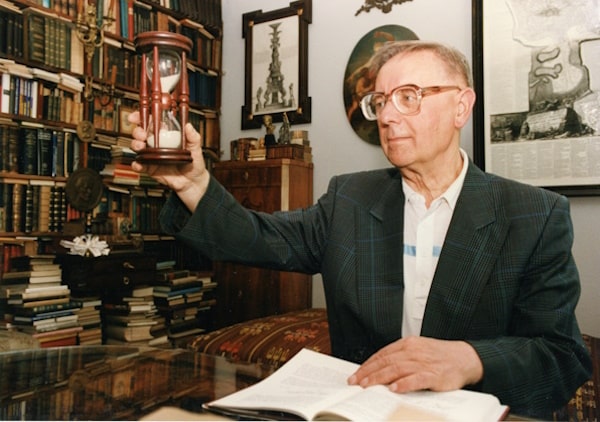
“What an extraordinary world must lie hidden under the undulating surface of the ocean! Even the most daring divers do not go deeper than a few dozen feet, and this only near the shore. And even the biggest fishing nets do not go much deeper. And yet there, at the very bottom, may exist great civilizations, huge cities, powerful states—exist and flourish—created by beings whose shapes and customs are simply unimaginable.” – Apuleius, in A Meeting in Oea
We strive to give Krawczuk’s books the graphic presentation the prose deserves by illustrating them with reproductions of old prints by the likes of Adolfo de Carolis, Jean de Bosschère, Giovanni Battista Cavalieri, Philippe Cherry.
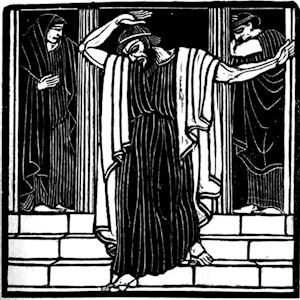
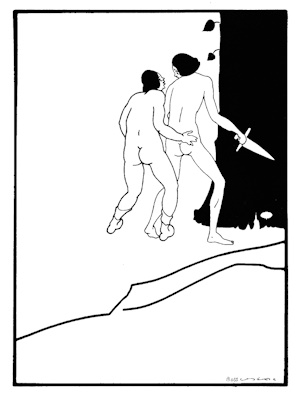


The following titles have appeared already:
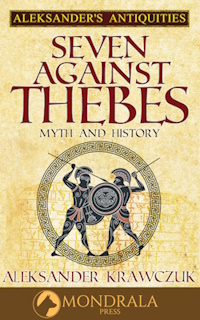
eBook: $9.99
paperback: $16.99
hardcover: $24.99
Before the Trojan War, there was the Theban War. To the heroes beneath the walls of Troy, the heroes of the Theban War were peerless and unattainable role models. Diomedes, son of Tydeus, so prayed to his goddess Athena:
Hear me, o daughter of Zeus! Stand by me, as you had once stood by my father, divine Tydeus, when he went against Thebes!
And King Agamemnon jeered him:
Woe to thee, son of brave Tydeus, the horse-tamer! Why do you tremble with fear? Why do you glance around, looking for a route of escape? Your father Tydeus was not wont to retreat in fear when he led bronze-clad Argives against the walls of Thebes!
What was the Theban War? Who fought it? What remains of the Homeric epics which described it? What can archeology tell us? How is mythology able to preserve the otherwise lost ancient past? And how do we relate to it? How does retelling of ancient myths adapt to say something about the present? Why does it appear to make us who we are?
Not a lecture but a guided walk. Pick up your copy today and escape into… intelligent pleasure.
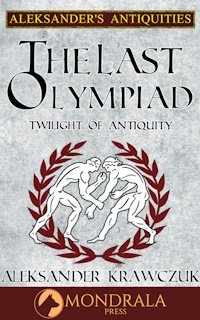
eBook: $9.99
paperback: $16.99
hardcover: $23.99
The six years 389-395 AD were a turning point in the Mediterranean world. They saw many dramatic historical developments, the first wholesale destruction of pagan temples, the last pagan revolt, the first murder of a sitting emperor by his Germanic body guard, and the last Olympic Games. Read all about it and about:
-the zany, crafty, and weird doctors of the Church
-the dyspeptic historian Ammianus Marcellinus
-three fanatic historians of the Church
-the grumpy rhetorician Libanius
-the blood-thirsty pagan scholar-defenders of the Alexandrian Serapeum
-the anti-Christian diatribe which somehow miraculously survived to our times (The Lives of Sophists) and its author
-and the quirky and mysterious figure of “Jorge Luis Borges of ancient Rome” (Authors of Imperial History)
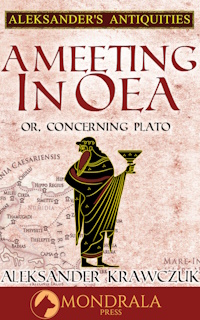
eBook: $9.99
paperback: $15.99
hardcover: $23.99
The quirkiest, zaniest, funniest book about Plato ever written by a scholar. Or anyone.
Meet Apuleius, Rome’s all-time best-selling author (of The Golden Ass, no less!), a Platonic scholar, a part-time magician, and a dowry-hunter, as he works on his treatise on Plato at night and schemes to marry a rich African widow by day.
An overview of Plato’s life and work as seen through the eyes of an engaging second-century AD Roman provincial, written in a lively, conversational style with occasional–but not too overwhelming–flashes of literary genius.
Aleksander Krawczuk’s books on Greece and Rome have shaped three generations of antique lovers in Europe.
They have been huge best-sellers because of their unassuming style: reading him feels like taking part in a pleasant chat after a nice dinner by the fireside, with a glass of sherry in hand.
His topics are important and may at first seem forbidding, but the good professor finds a way to talk about them in an unassuming way without dumbing them down in the process.
My personal favorite of all of Krawczuk’s books. A feast.
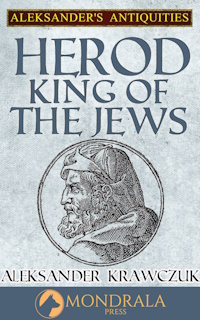
eBook: $9.99
paperback: $15.99
hardcover: $23.99
Herod was an Idumean, a half-Jew at best; a monster; a killer; a ruthless political operator. He was also his people’s great benefactor and the last Jew to rule all of Palestine in antiquity. There have been scores of books on the subject of Herod. Is there any reason to have another one?
Oh, yes! And how!
First of all, no other biography of Herod situates him within the Graeco-Roman milieu like this book does. For whatever reason, all books on Herod are somehow near-sighted. Somewhere on the periphery of the action appear large-looming figures–Pompey, Caesar, Crassus, Antony, Cleopatra, the Parthians. Their motivations are unclear; why they should care for or interfere in Palestine and Judea is uncertain; how and why Herod has to maneuver is a mystery. This book gives us the global perspective we need to understand the man and his works. It also explains how and why what happened in provincial little Palestine impacted the grand politics of Rome.
Second, in beautiful and vivid language, this book evokes the harsh geographic and economic realities of Palestine. Why was Jericho important? Why did the separate national identity of Samaria matter? Who were the Nabateans? What was the significance of the port of Caesarea? What was it like to be there then?And finally, there is the old Krawczuk touch: an easygoing and yet profound reflection on the biography of a politician and his posthumous reputation; and the fate of a small nation buffeted by the ambitions of great empires and the seemingly irresistible force of globalization.
Not an Italian, yet is Aleksander a master of the sprezzatura–the artful “off-the-cuffness,” stating profound things within a seemingly throwaway comment. As Rameau would have put it: hiding art with art.
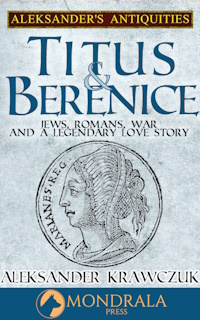
eBook: $9.99
paperback: $15.99
hardcover: $23.99
For five years, the fate of the last Jewish polity of the ancient world hung on the outcome of a romance A romance between the middle-aged, thrice-divorced Jewish queen, Berenice, and the youthful son of the first emperor of the Flavian dynasty.
The book describes the events of AD 66-69:
–the outbreak of the First Jewish War
–Nero’s artistic tour of Greece
–his overthrow and death by suicide
–the outbreak of the Roman Civil War
It couches the narrative in a broad intellectual and spiritual panorama of the times featuring many fascinating developments:
–the strange Jewish sect of the Essenes
–another strange Jewish sect: Christians
–its most dangerous opponent, the charismatic Simon the Magus whose followers worshipped a prostitute
–the wonderfully zany erotic religious practices of the Middle East of the period
–the pagan prophet Apollonius of Tyana–the “pagan Jesus”
–the powerful temple of Aphrodite in Paphos, Cyprus–the main clearinghouse of secrets in the East and a “business rival” of the Temple of Jerusalem
etc.
And among those events and within that milieu, the book situates the love between the middle-aged queen and her youthful Roman prince, the future destroyer of the Temple; a romance which will go on to inspire hundreds of dramatic, operatic, poetic, and graphic works in the European culture for the next two thousand years.
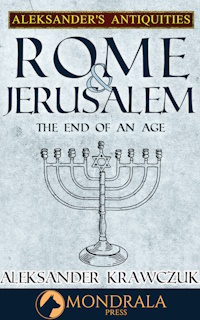
eBook: $9.99
paperback: $15.99
hardcover: $23.99
Following the Maccabee rebellion, one hundred years of wars reestablished the Kingdom of the Jews. Under Herod, it enjoyed thirty years of peace. Sixty years later–everything went up in flames. The Jewish Temple, the dream of national independence, the great love between the Jewish Queen and the Roman Imperial Prince.
All things fall apart. Old religions end in a conflagration, old kingdoms fall, not to rise again for thousands of years, old world view ends, love ends. And out of their ashes arises a new world: the Flavian dynasty, a new religion, a new world order.
One of Krawczuk’s most extraordinary works, a kaleidoscope of people, events and places leading up to Vespasian’s rebellion. An open-ended work inviting you to make your own sense out of the history you read.
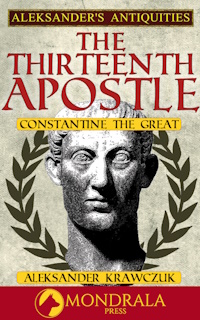
eBook: $9.99
paperback: $15.99
hardcover: $23.99
A highly readable account of the life and career of Constantine the Great—one of the most influential Roman Emperors.
The book traces the emperor’s political career as well as his religious development from a worshipper of Sol Invictus-Apollo to an avid Christian. It does so against a rich tapestry of the economic realities and intellectual trends of the age. Full of lively quotations—sometimes very moving—from ancient authors [see emperor Maximinus Daza’s pean in praise of the pagan gods], inscriptions, imperial edicts that let you hear the voices of the emperors and laudatory speeches, the story debunks many myths concerning the time of the emperor’s conversion, the supposed Edict of Milan, and the relationship between the emperor and the early Christian Church; and it traces the roots of Middle Ages feudalism.
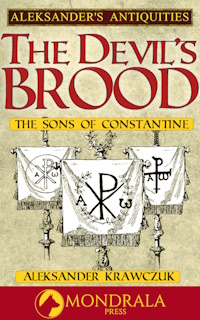
eBook: $9.99
paperback: $15.99
hardcover: $23.99
“Constantius approached his father’s catafalque ceremonially, in mournful concentration. He carefully lifted the purple cloak to take one last look at his father’s face, and at that moment, he saw with astonishment that the dead man’s hand was clutching a papyrus scroll. He took it out gently and read it:
I die poisoned by my brothers. I command you to avenge my death!
The massacre began that night.”
Like mad dogs, the sons of Constantine duke it out while, in their shadow, unnoticed, rises the last hope of pagan Rome, the gentle, beautiful boy named Julian, whom the posterity will call the Apostate.

Aleksander Krawczuk (1922-2023), was an institution: a scholar, professor a the Jagiellonian University in Krakow, minister of culture of Poland (1986-1989), and author of 40 immensely popular books on Graeco-Roman antiquity, and the only classicist with an internationally syndicated TV program. Until His delightful accessible, conversational, highly readable style, addressing complex topics in an approachable manner without ever dumbing them down, made antiquity come alive to both professionals and fans but also to ordinary readers who normally take no interest in the period. International best-sellers in Eastern Europe, his books have shaped three generations of antique lovers, but, as a consequence of Soviet cultural policies, they appear in English only now. We are publishing a new title every 2-3 months.
Special Offer

Get the entire trilogy in beautiful hard covers for 40% OFF and FREE SHIPPING!*
*(allow 2 weeks for delivery)





